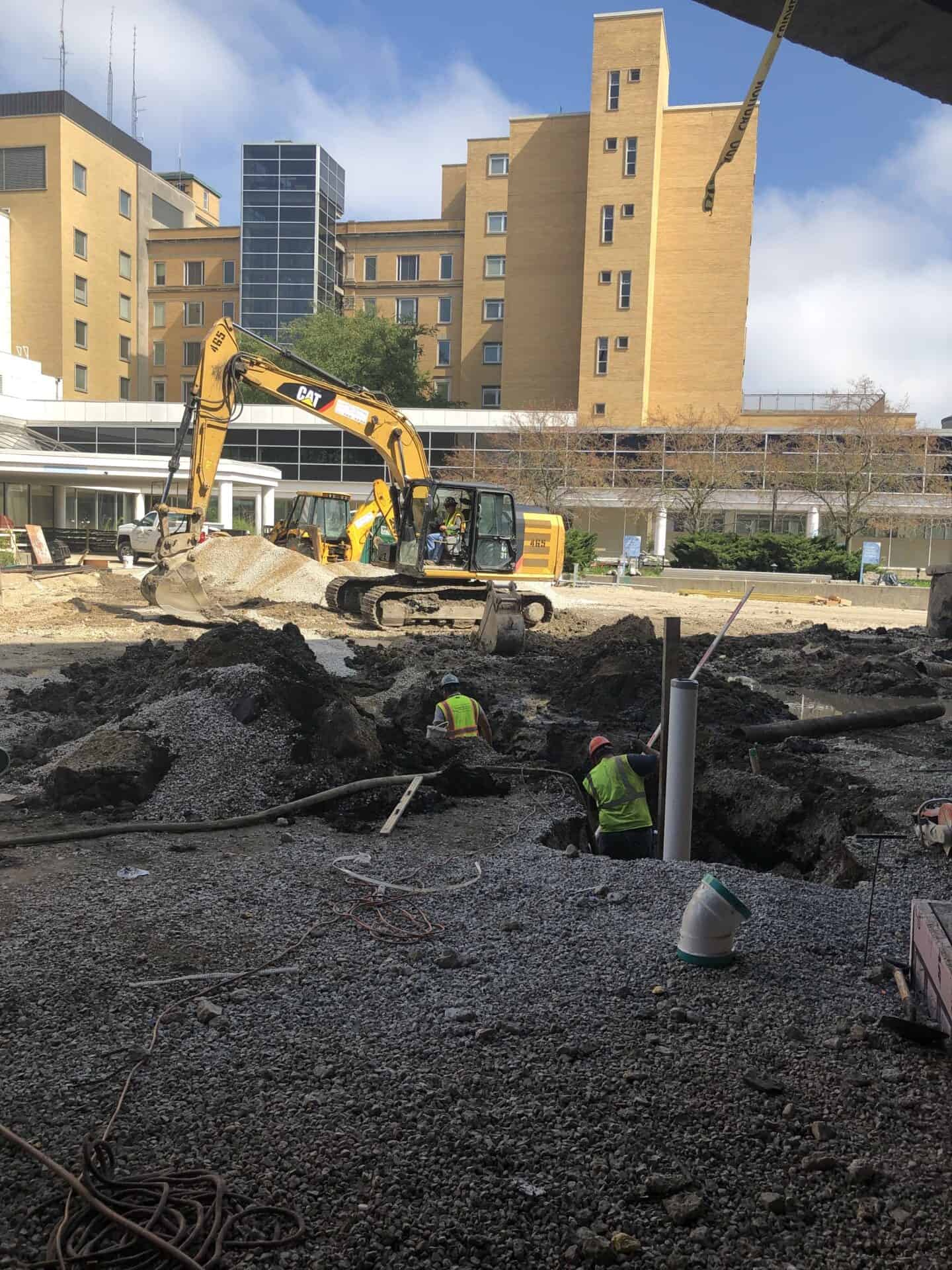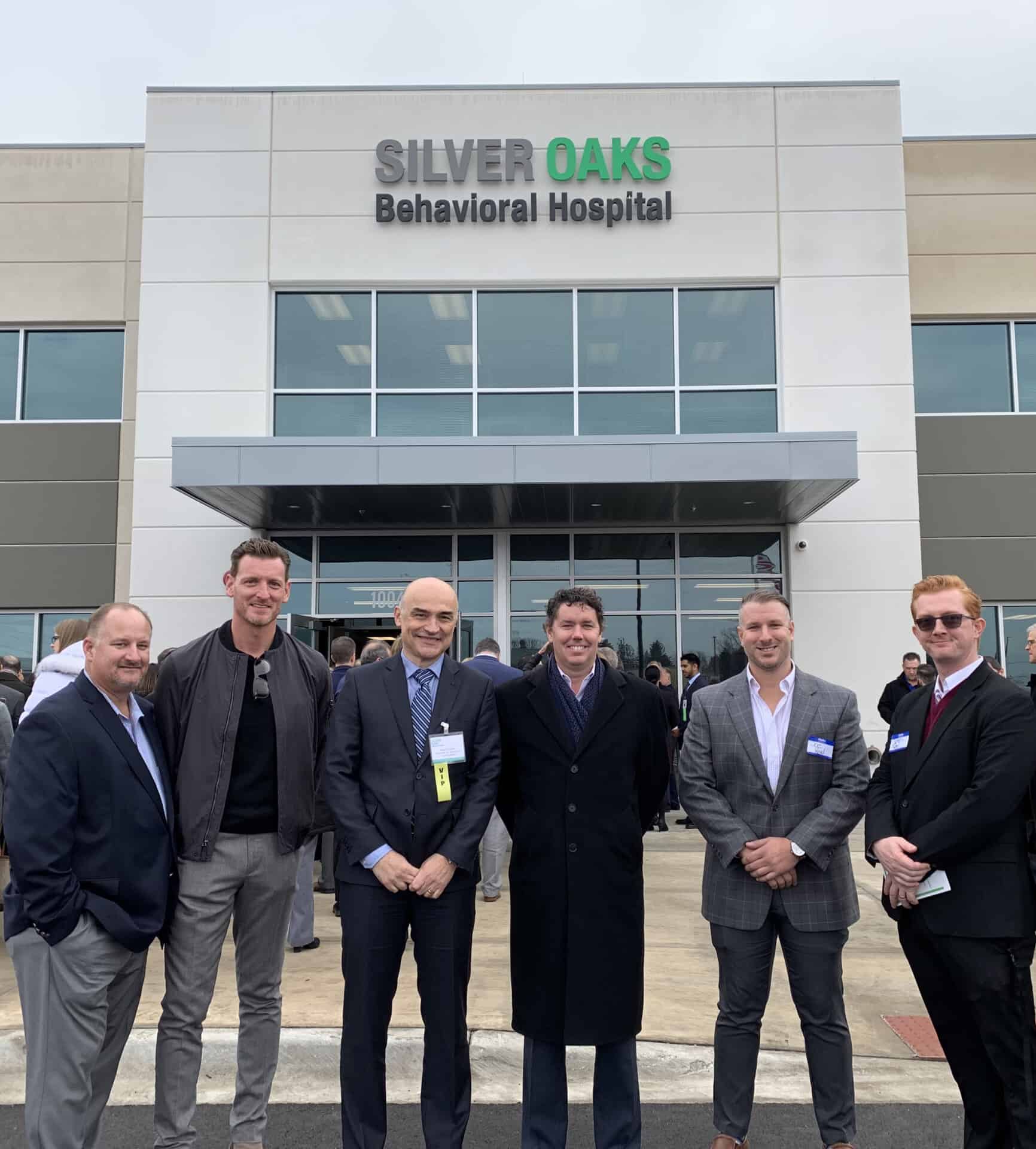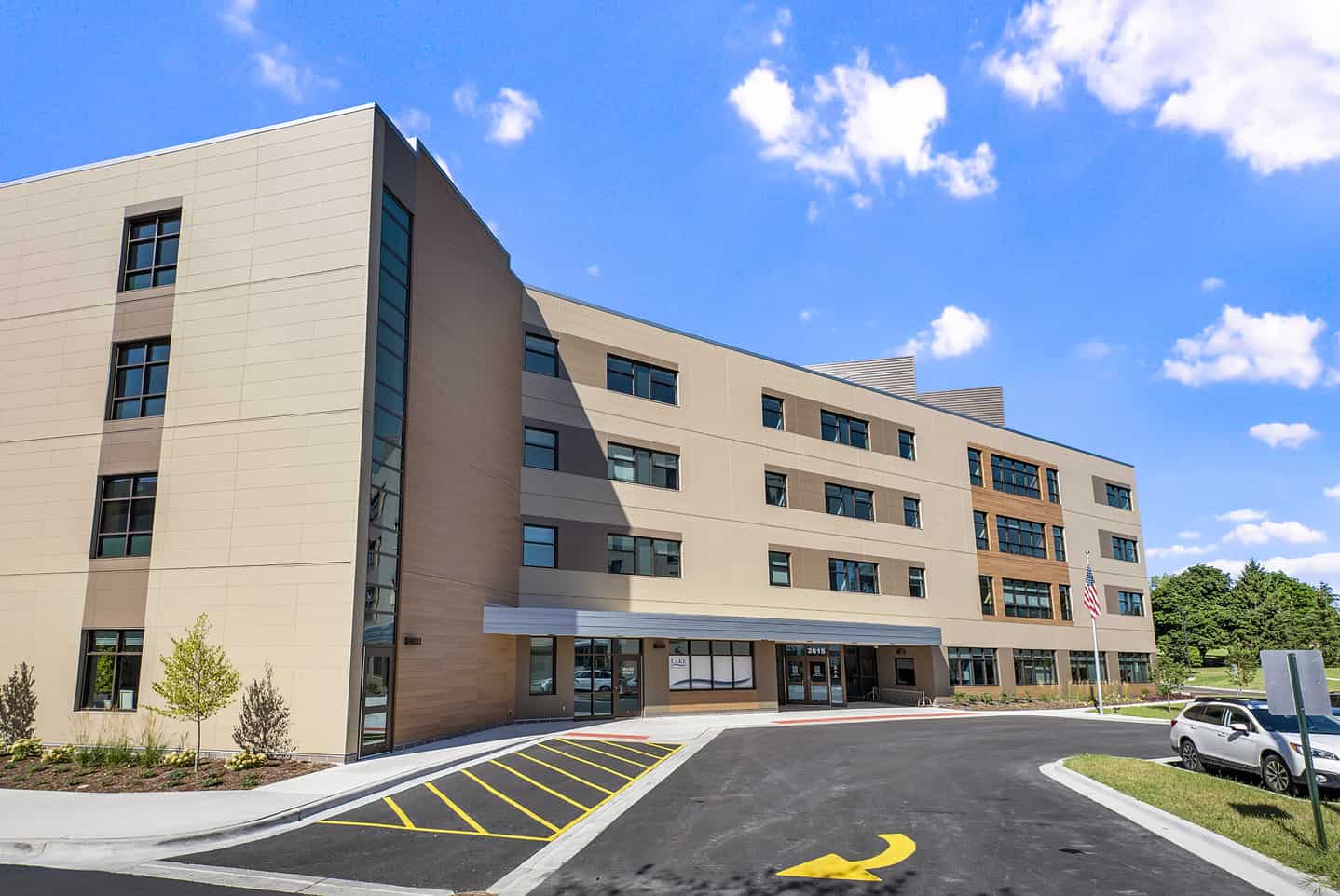May is Mental Health Awareness Month, making it a perfect time to highlight our partnership with US HealthVest. A behavioral healthcare company that is redefining the psychiatric hospital space and experience across the country, US HealthVest focuses on bringing much-needed services to areas without similar facilities. Reed has successfully completed multiple projects with them, including Lake, Silver Oaks, Chicago, and Hendricks Behavioral Hospitals in Illinois and Indiana. These hospitals provide critical psychiatric and substance abuse services to patients of all ages across a full continuum of care. Projects that support underserved areas are one way that Reed’s Generation 5 is building the next generation of extraordinary for our communities.
We took Mental Health Awareness Month as a chance to delve into how this long-standing partnership works. We spoke with Miro Petrovic, US HealthVest’s Vice President and an architect with over 25 years of experience, alongside Joe Kozlowski, our Vice President and Director of Operations, who is a key player in our work.
ON HOW THE PARTNERSHIP BETWEEN REED AND US HEALTHVEST GOT STARTED:

Joe: Eight years ago, we performed the job at Chicago Behavioral in Des Plaines, and we knew there would be more developments.
Miro: That was the first hospital we bought in Chicago – Chicago Behavioral Health. It was a closing hospital, with four patients left, and we renovated it. To this day, it’s our best performing hospital in our portfolio. That was 2015, so that’s how Reed got started helping us for the past eight years.
Joe: We won that job by a few thousand dollars, and it was because of a minor mistake I made on the estimate. Best mistake I ever made! [laughter]
Miro: [laughter] That’s right! We did have some unique experiences, including COVID’s early days where we were trying to build an open hospital while everyone else was shutting down. Reed’s been great to work with – so helpful. It’s a great relationship.
Joe: I was fortunate enough to get assigned to working with Miro, and that one project led to another and turned into a great relationship with US HealthVest. Every time we hit a standard, I want to break another barrier. So I call Miro a lot, asking, “Hey, what’s going on?” And we keep going from there, letting the relationship grow and expand.
Miro: [laughing] He’s greedy! He’s always saying, “What’s next?”
Joe: [laughing] That’s true. But at the end of the day, it’s because you’re highly respected as our client. Your overall experience and knowledge and how we structure contracts together gets things done, it gets things fast-tracked, and it gets your facilities open.
What was the moment in a project you two have worked on together, where there was the “aha” moment that cemented this as a successful team?
Joe: Chicago Behavioral Hospital was kind of the trial. But the stars aligned on Silver Oaks from a budget and schedule standpoint. Things were firing on all cylinders. Milestone dates that were established six, seven months in advance were getting hit as a team, and it was a true team effort. Once we got through some major hurdles from weather, and got the building enclosed, it just felt right. I knew that with the team members we had on the Reed side, and working with Miro so closely again, it was basically unstoppable. We knew it was going to be a successful project and a successful partnership. Silver Oaks opened early, too.
Miro: It did! The moment that I would bring up was when we were six weeks before the completion date. Reed’s superintendent Chuck tells me while I’m looking around on site, “You know, we’re pretty much done. Just cleaning up, finishing the little details, the punchlist.” And the job was in great shape! But six weeks before completion? It’s usually a madhouse, people are calling you in a panic. But it looked just the opposite. Reed was fully in control, things had been done well.
On top of that – the skilled trades you have do a good job doing what they’re supposed to do. I work around the country, and it’s not like that everywhere. The product looked good. We were discussing if the electrical face plates were the right color! [laughter] That, Joe, that set you up for success with us.

What role does the contract structure have on the partnership?
Joe: We tailor every contract so it makes sense, whether it’s lump sum or GMP, both for us to perform and to have financial protection on the project. We build in contingency through negotiating with subcontractors. It helps us keep that guaranteed number at the guaranteed number, not exceeding it. It gives us flexibility to maintain the schedule and accommodate changes on the project.
On the front end, we’ll sit down with Miro and with the design team, and say, “Okay, we’ve been through this once, twice, three times. What lessons did we learn that we need to integrate into the next project?” We’ll either emulate what went right, or we protect against making the same mistakes again. That upfront effort is as strong as possible, so we’re avoiding as many changes during the course of construction as possible.
Miro: I don’t think the secret sauce is the type of contract. I think the secret is the team that’s on the project, and the experience from Reed’s side. We know our product. When things are needed, the answers are quick and constructive in helping to move Reed’s process along. We’re not asking to move the kitchen to the other side of the building. There’s no change to the building that isn’t well thought-out, and nothing is more important than getting the facility open and getting patients care from an operational side. The costs in operating a facility aren’t in the finishes, it’s in things like number of staff needed to operate a unit. With all that planned out, we just have to execute it. That helps the contractor to get it done, and that helps the schedule tremendously. There’s no changes and no waiting for answers. It makes it successful at the end.
Joe: That’s a really good point to bring up. On all the projects, we’ve been able to get on the phone direct to the source. I can call Miro on a walk-through and talk through small design things, nothing critical. Knowing you, Miro, I can ask you “yes or no?” on different things so we get that direction immediately. There’s no hold up in the schedule. Then afterwards I can follow up and formalize those later through RFIs and other documentation. Getting those answers extremely quickly without lag time –
Miro: There’s a level of trust.
Joe: Yeah, exactly. A lot of our continuity too has been in the field. Our team understands how you think, to a certain extent. We can say, “Hey, I think this is what Miro is going to want,” and so we can propose ideas and move forward and trust that we’ll make the right decisions together.
What project had the biggest challenges for the Reed/US HealthVest team to tackle?

Joe: Probably Lake Behavioral in Waukegan. There were a lot of challenges on that one, surprisingly.
Joe: That was interesting, no doubt. We were at the low point of the site, near a protected wetland. We lost roughly 30 days due to weather. Then two months out from completion, COVID became very relevant, and that’s when there was a lockdown order –
Miro: It was worse, we finished in May 2020, so it was the time when nobody knew what was going on. Even the state, for licensing, came out over video to approve things over Zoom.
Joe: I remember the day when we were watching the news and the stay-at-home executive order came out. We were wondering, what does this mean? Is construction still able to operate? Are we mission critical? Our superintendent was already outside trying to lock things up. I ended up going to tell him, “Hey, I just got off the phone with Miro, we’re good. We’re actually staffing up. We’re going to start working weekends to get this done.” It was a very nerve-wracking time, because we lost some time, we made some up, and we pushed through it. There were some challenges at the tail end there. But we got a plan together and worked it out.
Miro: That doesn’t go without pressure. From the owner’s side, when you have a new hospital, whether it’s ground-up or a renovation but there’s no preexisting [behavioral health] facility there, you have to start hiring staff three months prior to opening. All of these people have to quit working somewhere else and agree to come join us, and they’re joining something they can’t see.
We have to hit about 40 or so people on day one in order to get licensed and accept the first patient. Prior to that, we’ve reached out to local med-surg hospitals, clinics, and providers, and connecting to patients that have nowhere to go but who need this care. We’ve told them all we’re opening at a certain time. It has a regional impact, really.
That’s one of the keys: if we’re falling behind in schedule for whatever reason, I need to know that immediately so I can tell the network of people the adjustment. It’s not good news, but it’s news better told before the eleventh hour. On the business side, because you need to bring these skilled staff people in from somewhere else to work in this new hospital, you have to give them the sense that things are going well. Towards the end, the schedule is so important because of all the relationships and hiring. The whole process of opening healthcare facilities is another project on its own.
We’re grateful for long-standing partnerships like the one we enjoy with Miro and US HealthVest. Everything we do at Reed is motivated by a sense of urgency, staying solutions oriented, and always taking a transparent approach. Partnerships between project stakeholders like the one between Miro and Joe demonstrate the value of that transparent communication.
Reed Construction’s unique approach to every project fosters our clear understanding of client goals and expectations. That’s how we deliver the true Reed experience for clients like US HealthVest: incredible healthcare projects that are built for the next generation of extraordinary and, for making a true difference in the community.
If your next healthcare project or beyond needs unparalleled personalized service, let us know. We would love to make your vision a reality.
[Editor note: Miro and Joe’s responses have been edited for content, length, and clarity.]